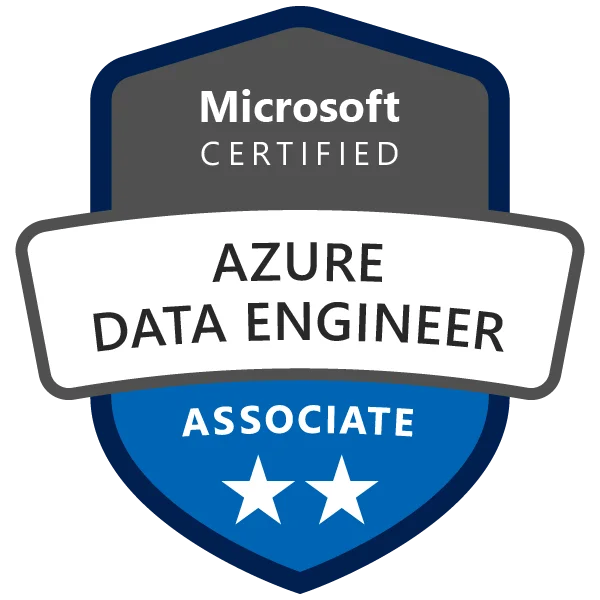Get new IT skills, get certified and lift your IT career to new heights without breaking the bank!
Unlimited Training - IT Courses and Certifications made simple and insanely affordable. Get access to 60+ LIVE instructor-led Courses for the price of less than one course.











course: Microsoft Certified Azure Data Engineer (DP-203)
Duration: 4 days
Format: Virtual or Classroom


Overview
Master Azure Data Engineering with our specialized training course. Learn to design and implement data solutions using Azure data services. From data ingestion to data transformation, this course covers all aspects of Azure data engineering. With hands-on labs and expert-led instruction, you'll gain the skills needed to pass the DP-203 exam and become certified as a Microsoft Certified Azure Data Engineer. Enroll now and become an expert in Azure data engineering with our comprehensive training and certification course.
 Instructor-led training
Instructor-led training Practice test
Practice test Pre-reading
Pre-reading Personal Learning Path
Personal Learning Path Certification Guarantee
Certification Guarantee Email, chat and phone support
Email, chat and phone support









Who is this course for?
The Microsoft Certified Azure Data Engineer (DP-203) certification is designed for professionals who design and implement the management, monitoring, security, and privacy of data using the Azure data services. The certification is ideal for data engineers, data architects, and database administrators who want to validate their skills and knowledge in this area. The DP-203 exam covers various topics related to Azure data services, such as designing and implementing data storage solutions, designing and implementing data processing solutions, designing and implementing data security and compliance, and monitoring and optimizing data solutions. The exam also covers topics related to designing and implementing data integration and data migration solutions, using Azure Synapse Analytics and Azure Databricks, and working with Power BI and Azure Analysis Services.
Curriculum
Preparation
At Readynez, we provide many resources and have experienced experts in the field. That is why we also have great success with many satisfied customers. You can therefore safely take your course with us. To take the DP-203 course, however, some prior knowledge is required.
This prior knowledge gives you the perfect starting point for taking the course:
Meet some of the Readynez Instructors you can meet on your course. They are experts, passionate about what they do, and dedicated to give back to their industry, their field, and those who want to learn, explore, and advance in their careers.

Tiago Costa is Microsoft MVP and a Cloud Architect and Advisor and International speaker on the Microsoft Cloud.
Tiago Costa is a Cloud Architect and Advisor on Microsoft Azure. For the past years he has been architecting and developing solutions using Microsoft Azure for some of the fortune 500 companies.
Due to his strong real-world experience, Tiago regularly teaches Microsoft Azure classes around the world. Microsoft Azure MVP since 2016 for his community efforts in promoting and sharing knowledge with the community.
Tiago has 40+ Microsoft Certifications including MCT – Microsoft Certified Trainer - and got awarded as MCT Regional Lead every year since 2016. He’s the founder of the Azure Portugal User Group. He loves diving into new technologies and to share his experience at conferences and training classes, but what excites him about his work is to help others exploring new frontiers in technology impacting their life’s, making the world a better place for everyone. His free time is spent with his family in the sunny Lisbon, Portugal building cool and geek projects

Ed is a Microsoft MVP for many years and has authored several Microsoft Official Curriculum Courses for Azure, Windows Server and Windows.
He is a 25 year IT veteran with experience in the UK Police and armed forces. Ed is a former Microsoft Technical Evangelist and is an MCT Regional Lead for the UK and he currently holds the most prestigious Microsoft MVP accreditation. Ed also helps run the UK MS Cloud User Group and the annual Evolve Conference in the UK.
Ed has authored several Microsoft Official Curriculum Courses for Azure, Windows Server and Windows as well as writing courses for Opsgility and other online providers.
Ed is a regular conference speaker at events such as TechEd, Ignite, TechSummit, SpiceWorld and more.
Ed now spends his time mixed between teaching Microsoft Azure, Windows Server and Enterprise Mobility topics. In addition Ed provides consultancy services to Small and Medium Enterprises as well as direct to Microsoft UK and Microsoft Corp.
FAQ
Microsoft Certified Azure Data Engineer certification validates expertise in designing and implementing data solutions using Azure data services. It demonstrates proficiency in building and managing data pipelines, data storage solutions, and data processing architectures on the Azure platform.
Readynez's DP-203 Microsoft Certified Azure Data Engineer course is your gateway to mastering data engineering on Azure. Prepare for the exam and become certified as an Azure Data Engineer with our comprehensive training program. Gain the skills and knowledge needed to design and implement data solutions that drive business insights and innovation.
Prerequisites for Microsoft Certified Azure Data Engineer certification include fundamental knowledge of Azure services, data engineering concepts, and experience with data processing technologies. While there are no mandatory prerequisites, having hands-on experience with data engineering tasks and familiarity with Azure data services is beneficial for exam preparation.
The cost of the DP-203 exam €142.
The DP-203 exam covers topics such as designing data storage solutions, implementing data processing solutions, building data pipelines, managing data security and compliance, and optimizing data performance on the Azure platform. It assesses candidates' abilities to design and implement end-to-end data solutions using Azure data services effectively.
Yes, Microsoft Certified Azure Data Engineer certification is valuable for professionals seeking to specialize in designing and implementing data solutions on the Azure platform. It demonstrates expertise in building scalable and reliable data architectures, performing data integration and transformation, and implementing advanced analytics solutions, opening up career opportunities in data engineering and analytics roles.
The time it takes to become Microsoft Certified Azure Data Engineer certified varies depending on individual experience, study habits, and dedication. Typically, candidates spend several weeks to a few months preparing for the DP-203 exam by studying relevant materials and gaining hands-on experience with Azure data services.
Yes, the DP-203 exam can be taken online from the comfort of your own home or office. Microsoft offers online proctoring options for many of its certification exams, including the DP-203 exam. Ensure your computer meets the technical requirements and follow the registration process to schedule your online exam session.
The difficulty of passing the DP-203 exam varies based on individual experience, preparation, and familiarity with Azure data services and data engineering concepts. Candidates with a solid understanding of designing and implementing data solutions using Azure services, combined with effective study strategies, are more likely to succeed in passing the exam.
The passing score is typically around 700 out of 1000.
Maintain your Microsoft Certified Azure Data Engineer certification by staying updated with the latest Azure data services, updates, and best practices for data engineering. Engage in continuous learning through relevant training programs, webinars, and community forums. Additionally, complete recertification requirements as outlined by Microsoft to ensure your certification remains current.
Salary potential after obtaining Microsoft Certified Azure Data Engineer certification varies depending on factors such as location, industry, experience, and job role. Professionals with expertise in designing and implementing data solutions using Azure data services can command competitive salaries in data engineering and analytics roles, offering excellent earning potential.
Reviews

The instrcutor was brilliant. The best I've taken courses from, both in classrom and on-line.

I am really enjoying the training. The Readynez trainer is fun, clear and gives lots of examples that make the subject easy to follow and understand. The mix of explanation, slides, video and self-paced tutorial is perfect.
Why Pay More??
Why settle for just one certification course when you can attend ALL certification courses for the price of less than one single course?

A perfect tool to help us develop the skills and competencies we need for success
 Kasper Meyer Christensen
Kasper Meyer Christensen
Businesses leveraging Readynez Unlimited save at least 50% on their training and certifications - and many up to 80%
Unlimited license holders attend on average 2.4 courses per year

For the price of less than one course.

Just cheaper and more flexible.

The easiest, most flexible and cheapest way to get Certified.

Attend as many courses you want - no limitations!

Refund provided if license costs surpass the value of your training.

Interact 1-on-1 with 50+ seasoned instructors.

